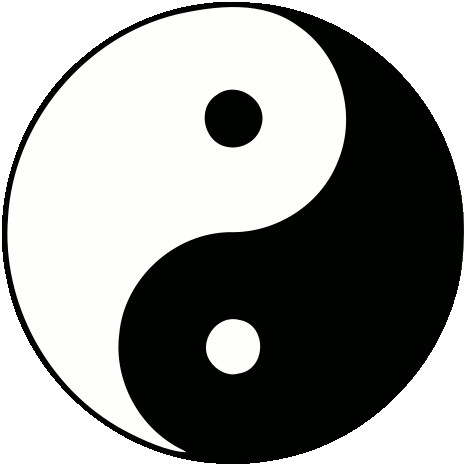Zhuangzi and Scale
Rather than talk about science in this post, I’m going to talk a little bit about the Zhuangzi, a Daoist text written by a Chinese philosopher (also named Zhuangzi) who lived around 400 BC. For those who don’t know a lot about Daoism, it’s a popular philosophy/religion that began in China that emphasizes the play of opposites, the unity and multiplicity of the natural world, and a fundamentally mystical ontology. Dao means ‘way,’ and within the religion it represents both a kind of ethics as well as a mystical life source from which the world springs from. I won’t go into an in-depth discussion about the religion (You can always read about it on wikipedia) but maybe some parts of it can be intuitively understood in the famous symbol from the religion, the yin and yang.
The black arm and white arm are always pushing on each other, but equally balanced, and each contains a bit of the other within itself. Equally as helpful are the first two lines from the main text of the religion, the Dao De Jing, which go:

“The Dao that can be described is not the absolute Dao; the name that can be given is not the absolute name.”
which has a wonderful self-undermining quality in which the whole text pretty much begins by saying that everything that follows is not the true way/Dao and any attempt to name or describe the way/Dao will not succeed. Dao, then, is forever an incommunicable and mystical concept.
The Zhuangzi is one of the other major texts of the religion besides the Dao De Jing, and is notable because it’s often funny, absurd, and full of word play and talking animals- a unique thing among religious books. One of the main themes in the book is actually about relative magnitudes of space. The opening line of the book beings with a parable:
“In the dark sea of the north there is a fish; it is named the Kun. The Kun is so huge no one knows how many thousand li he measures. Changing, it becomes a bird; it is named the Peng, so huge no one knows how many thousand li he measures. Aroused, it soars aloft, its wings like clouds hung from the sky. As the sea shifts, it turns to set its course toward the dark sea of the south, the Pool of Heaven.”
From the translation’s footnotes, Kun means “roe,” or fish-egg, the tiniest little thing. A “li” is a unit of measure which is about a third of a mile. So already, magnitudes of scale are being mixed and reinterpreted. Since we are humans, we naturally compare everything relative to our own size. Zhaungzi begins immediately by trying to muddle this and get us to think beyond our anthropocentric view, or at least see it in a new light. Things like mountains are big because it takes days or weeks for us to climb up one, while an anthill is small because we can step over one with barely any effort. But to an aphid, the anthill would seem large, and the mountain probably unimaginable.
As a corollary, it’s interesting to think about how with the invention of cars, we can now go up mountains much quicker than we can hike one, and how this probably has changed how big mountains feel to us. Same with the distance between cities. When someone asks you “how far away is Philadelphia from DC?” people often give a response like “Oh, it’s about 2.5 hours away.” This is a very interesting way of responding, as it allows the distance between cities to shrink proportionally to the speed of the transportation that connects the two places.
Anyway, perspective is a big topic in the Zhuangzi. He often writes from the perspective of other animals and plants to get readers to stop making assumptions about the nature of the world that aren’t necessarily true. Big things aren’t necessarily big, it depends on what you’re referencing size with. To every concept of length, there is a concept of a ruler. Likewise, a feeling of time is coupled to the kind of clock you’re using. Old things aren’t necessarily old, and beautiful things aren’t necessarily beautiful. Same with almost everything else. The only thing that seems to be free from this relativism according to the Daoist is the Dao itself, which is conveniently never defined.
Below is an excerpt of the beginning page of the Zhuangzi, continuing from the excerpt I gave above. It’s a fun book to pick up whenever you want to be forced to think from a different perspective.
Little understanding cannot come up to great understanding; the short-lived cannot come up to the long-lived. How can we know this is so? The morning mushroom can understand nothing of the alternation of night and day; the summer cicada can understand nothing of the progress of the seasons. Such are the short-lived. South of Chu one finds a lizard called the Dimspirit which counts five hundred years as one spring and five hundred years as one autumn. In high antiquity there grew a great rose that counted eight thousand years as one spring and eight thousand years as one autumn. Such are the long-lived – yet today Pengzu is the best known exemplar of longevity, whom crowds of men wish to equal. How pitiful!